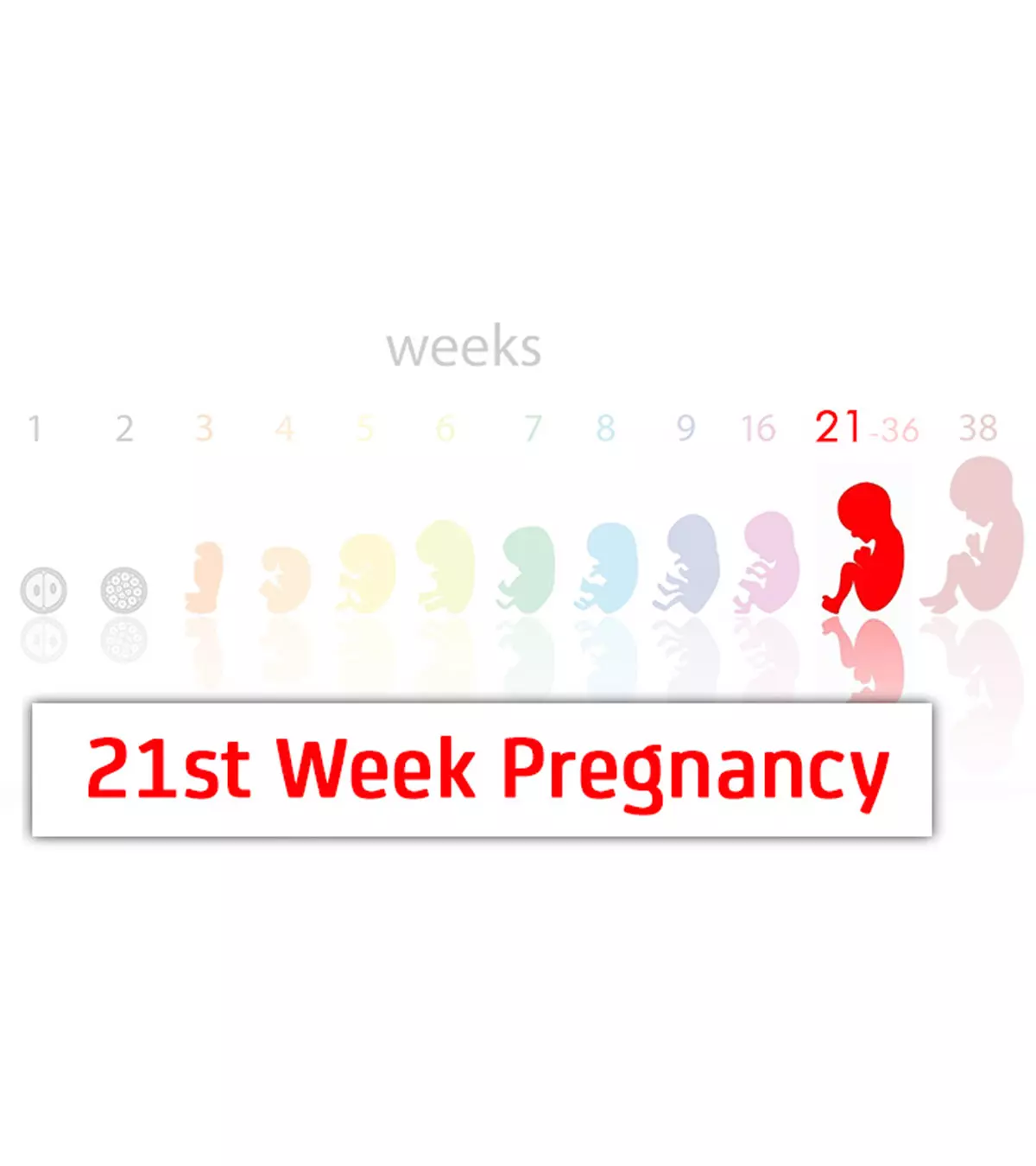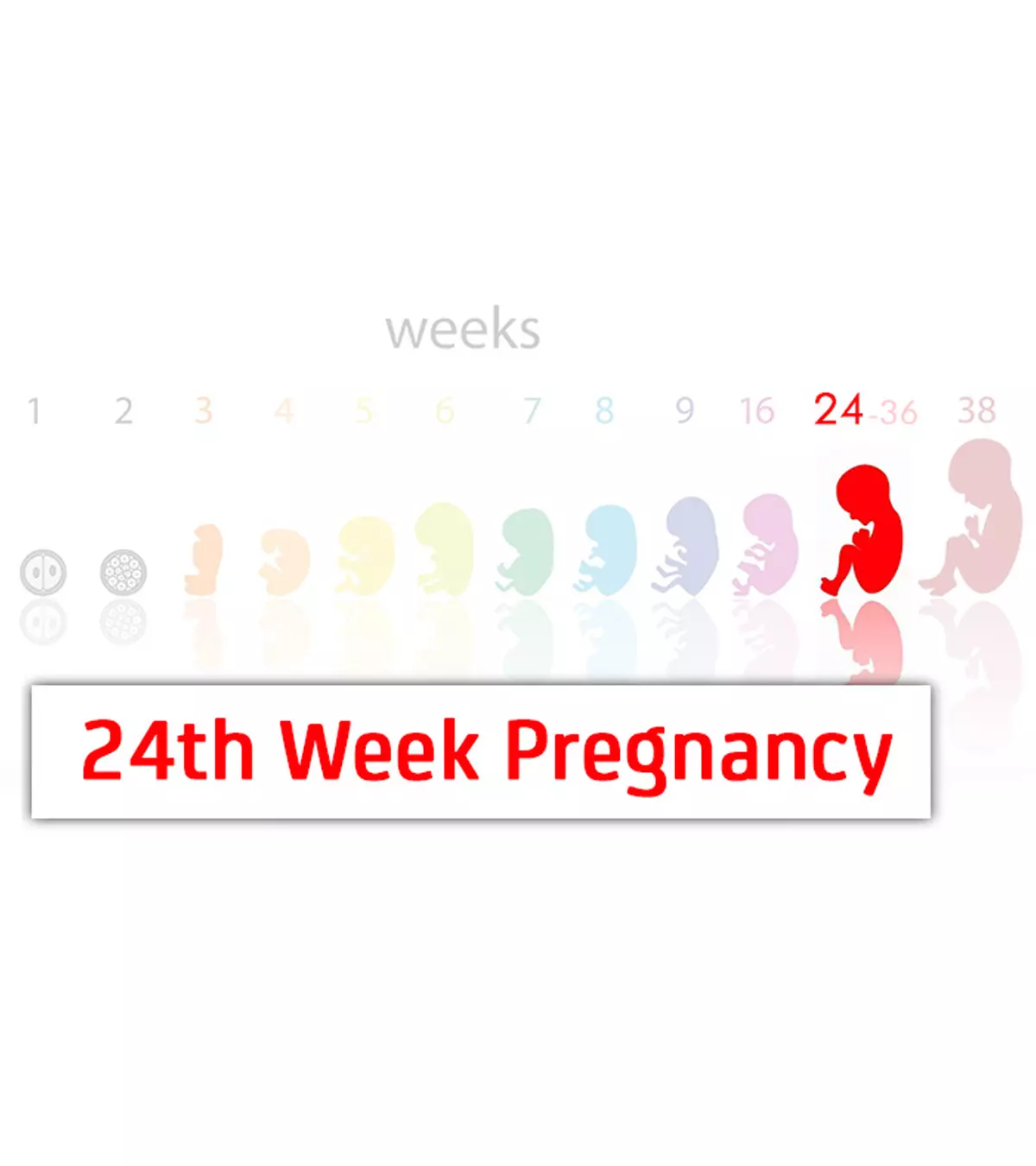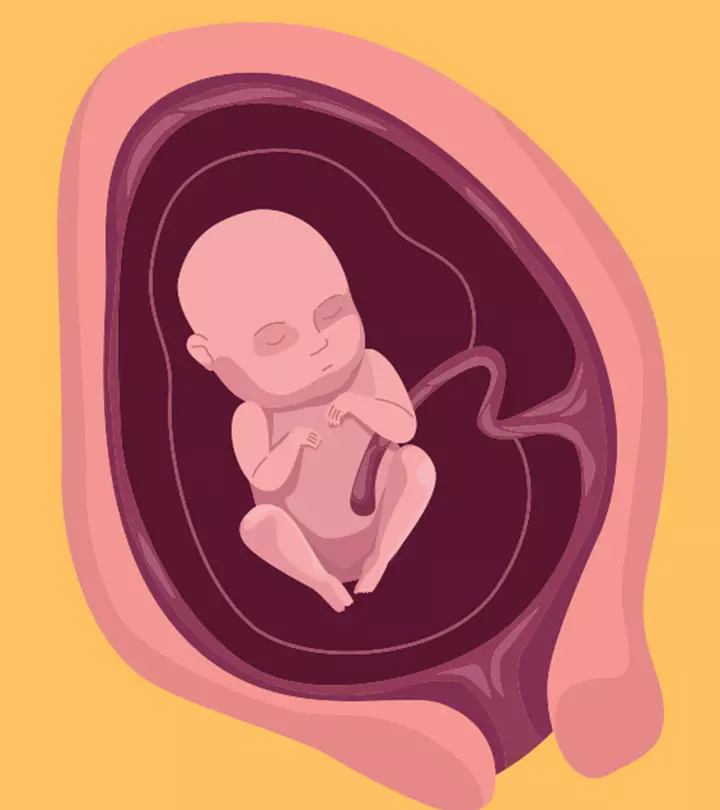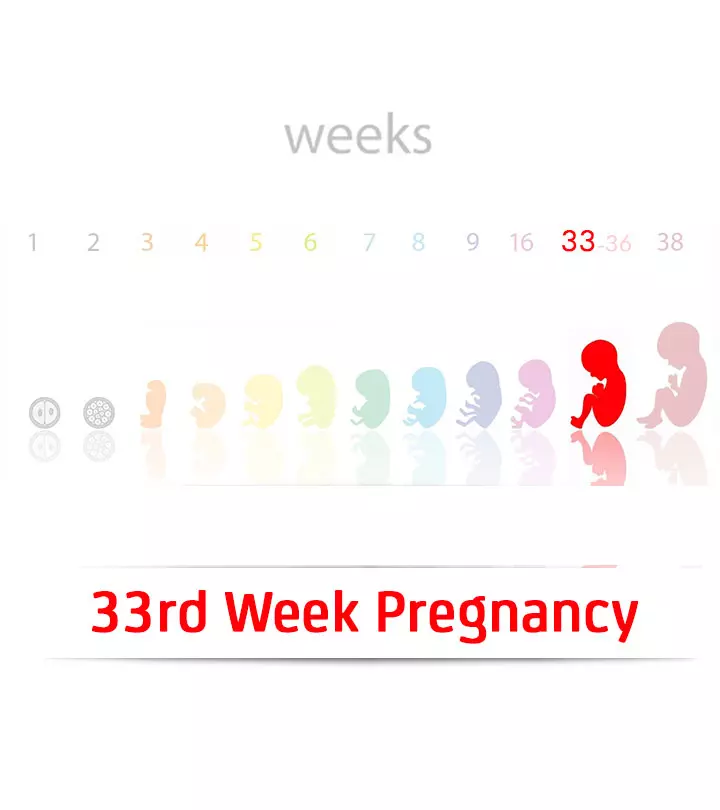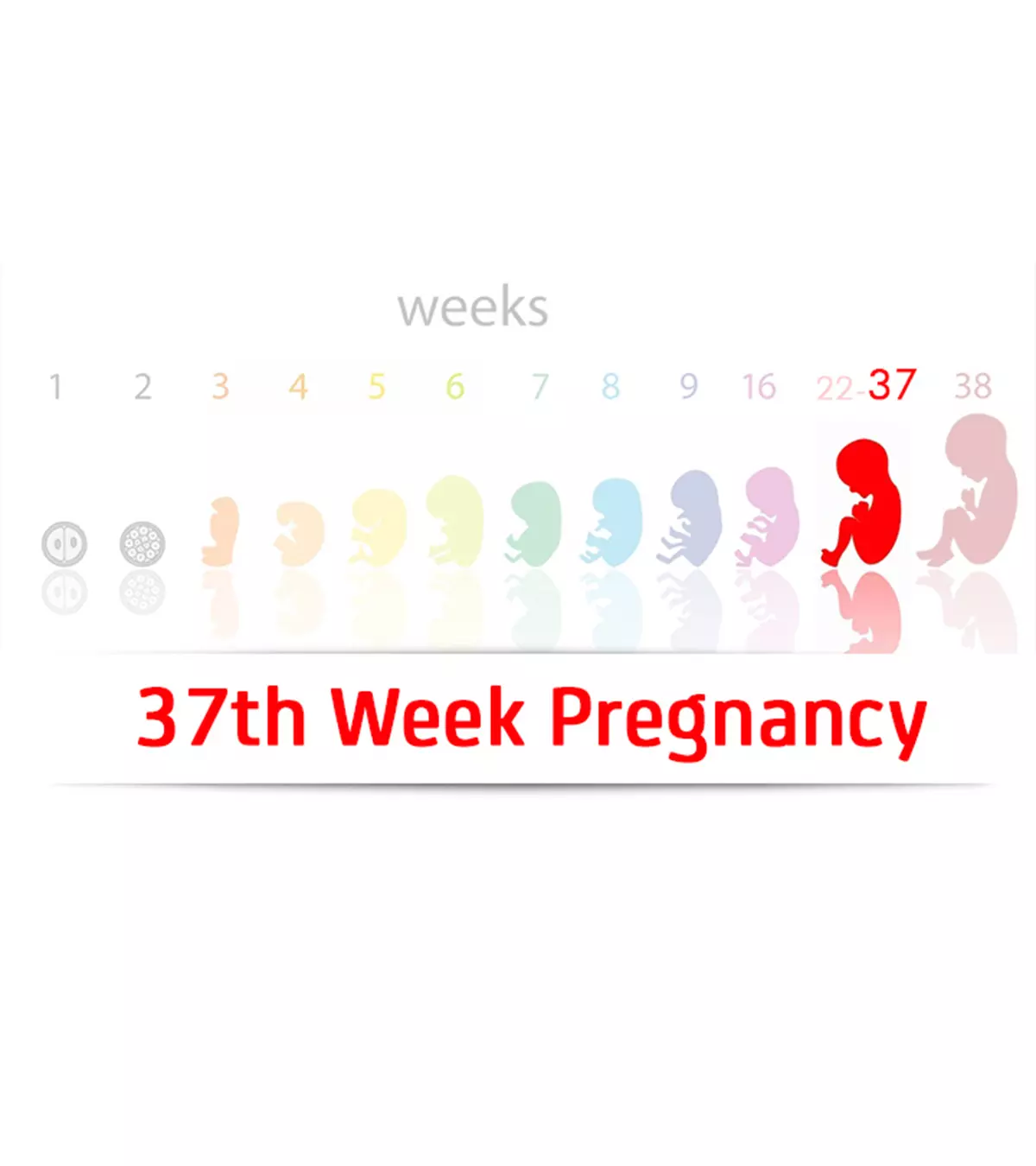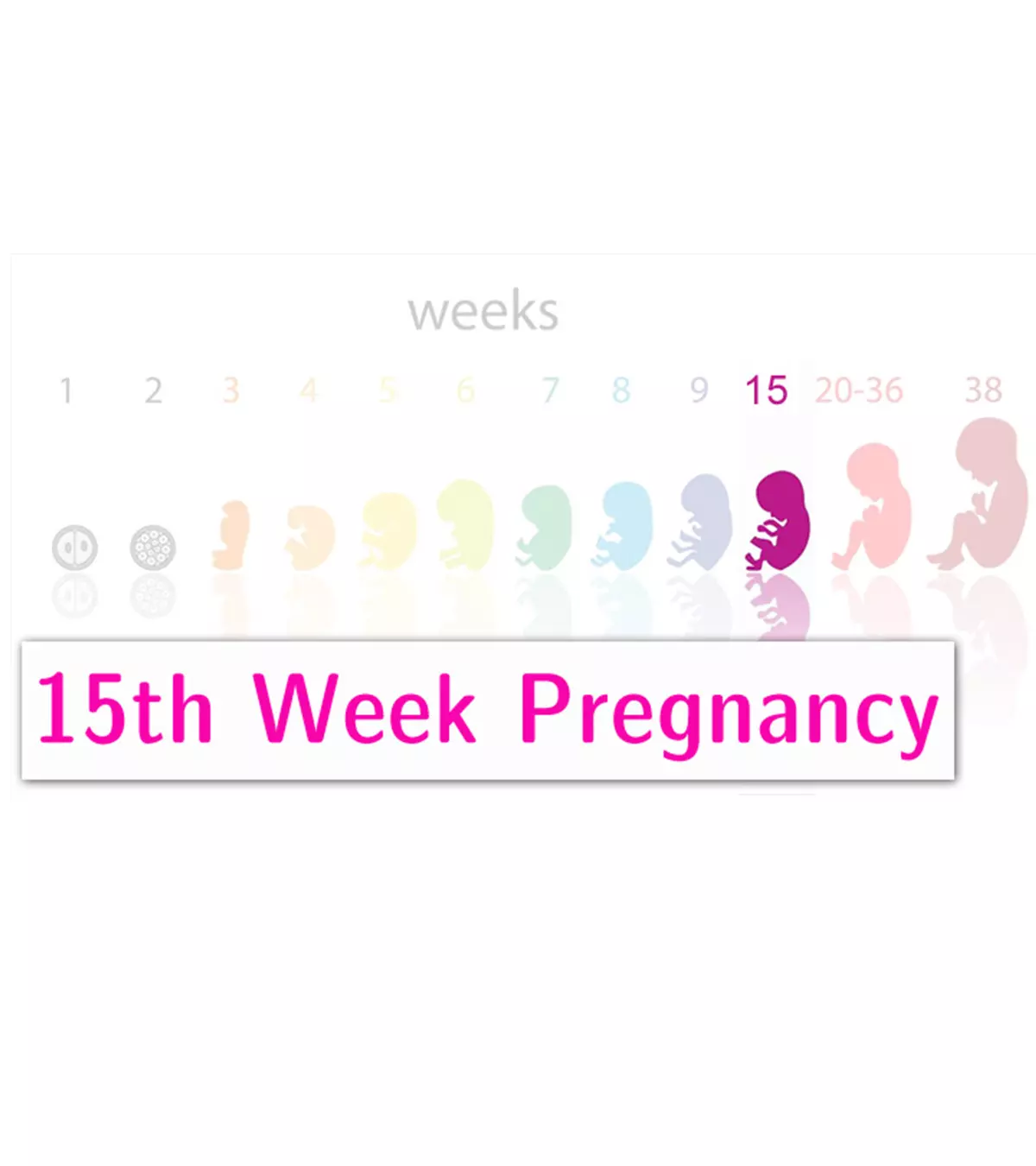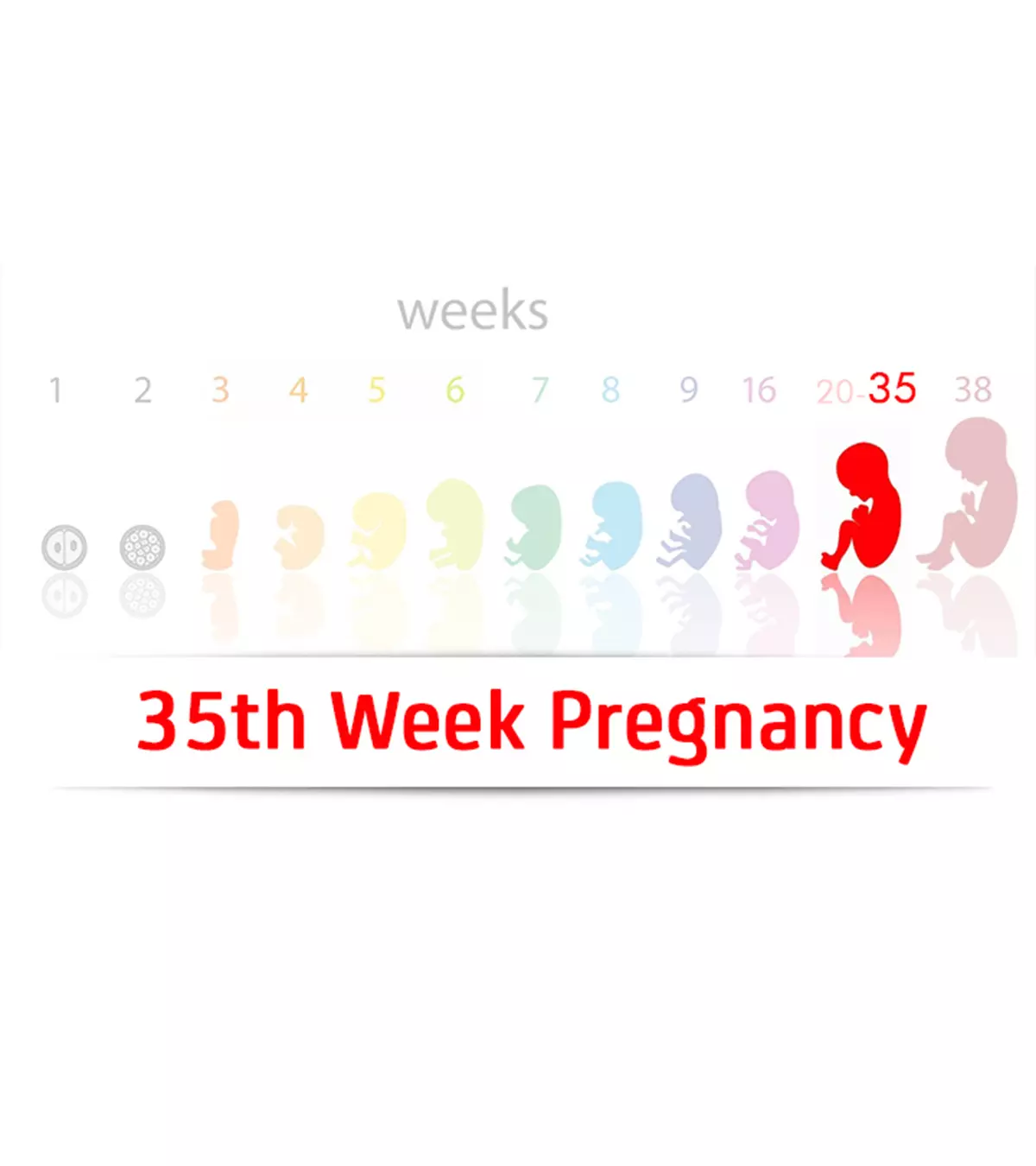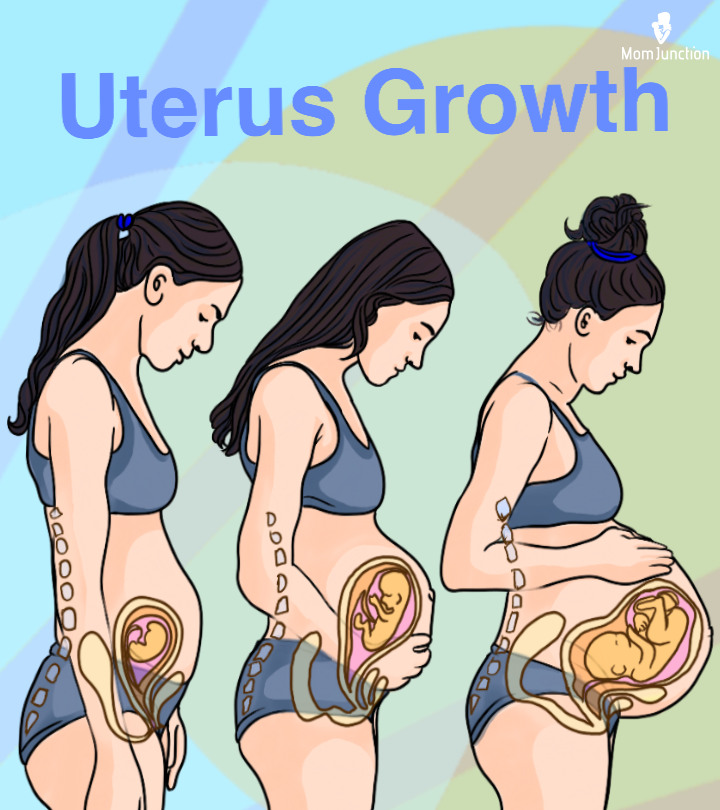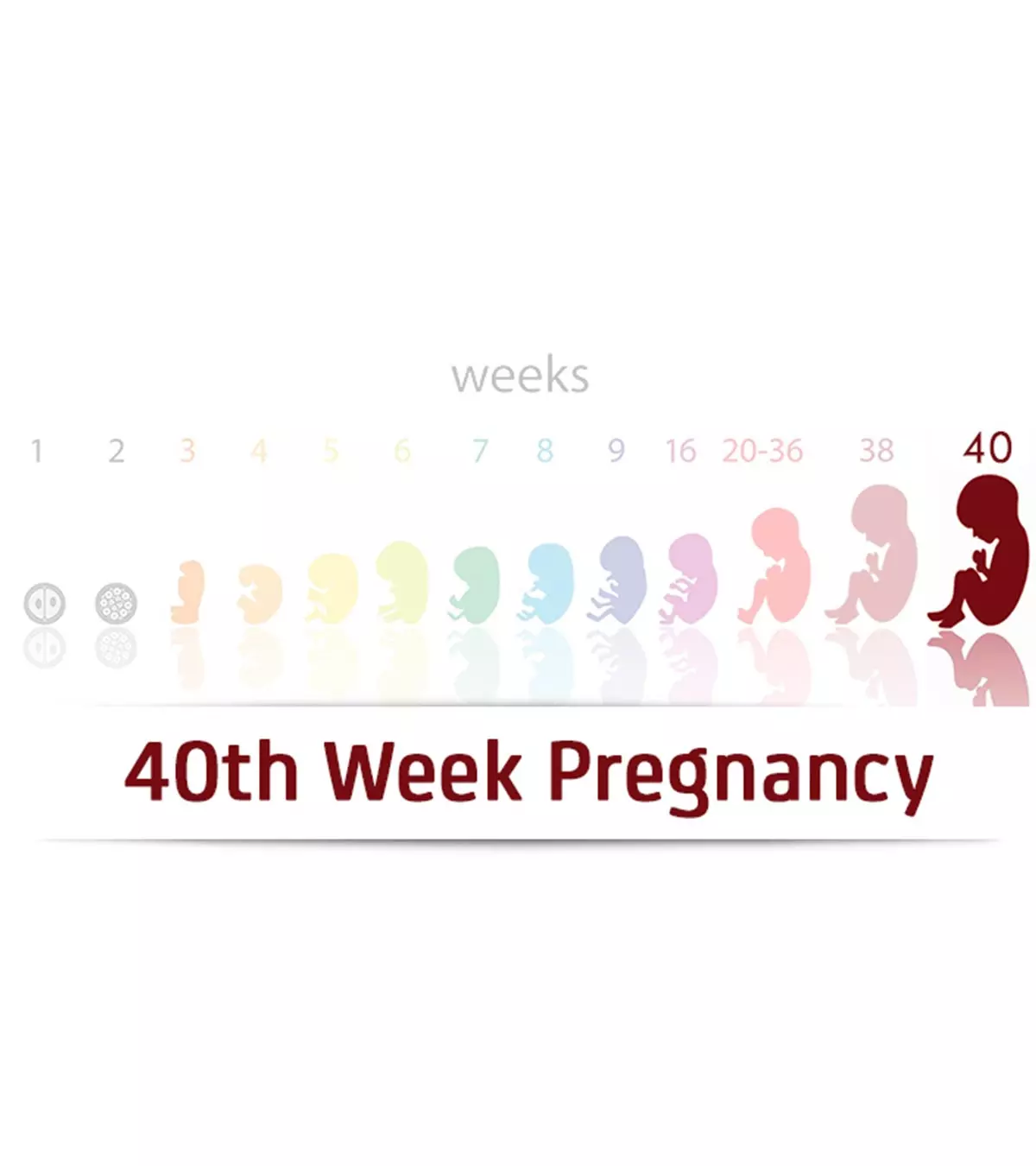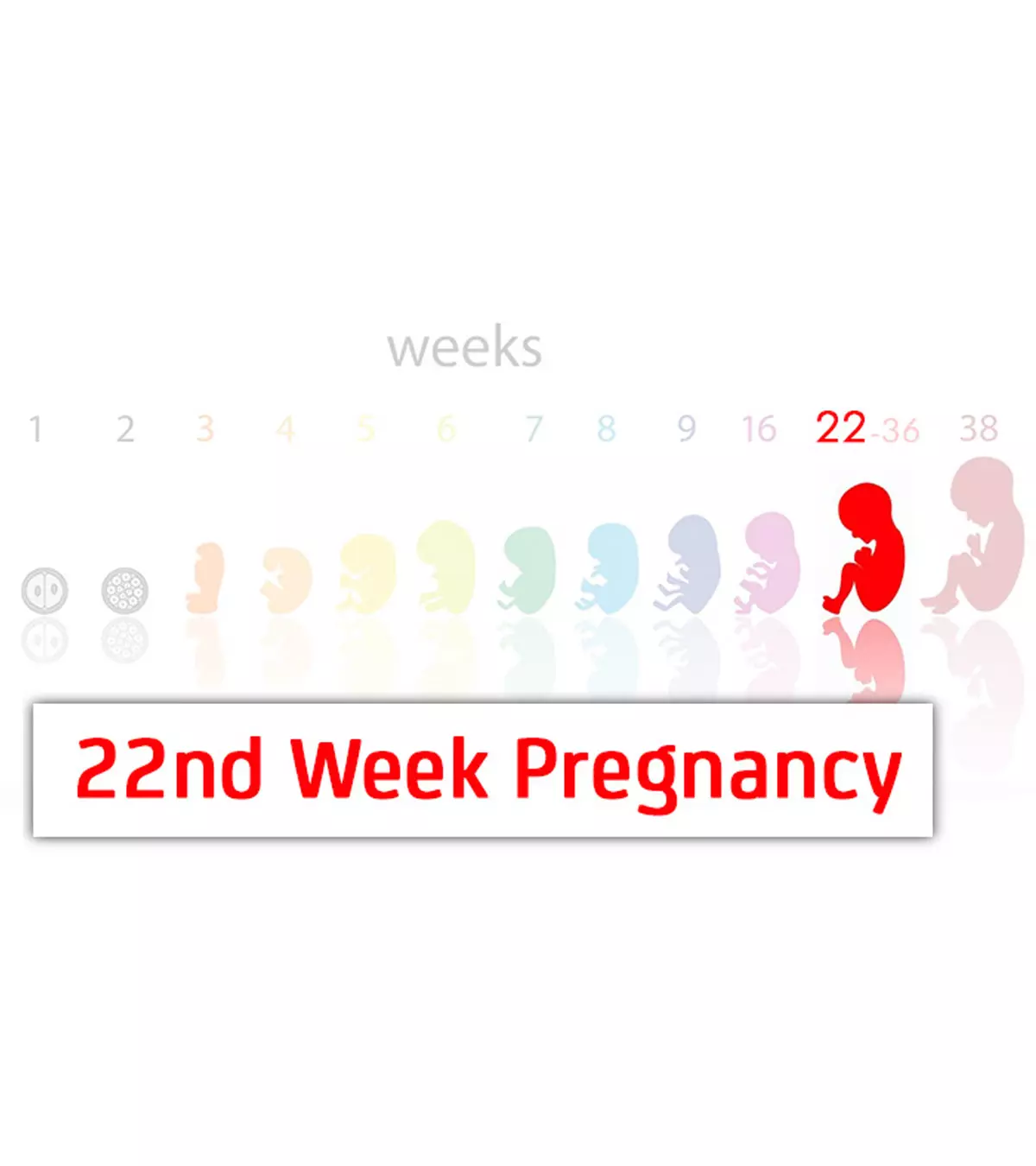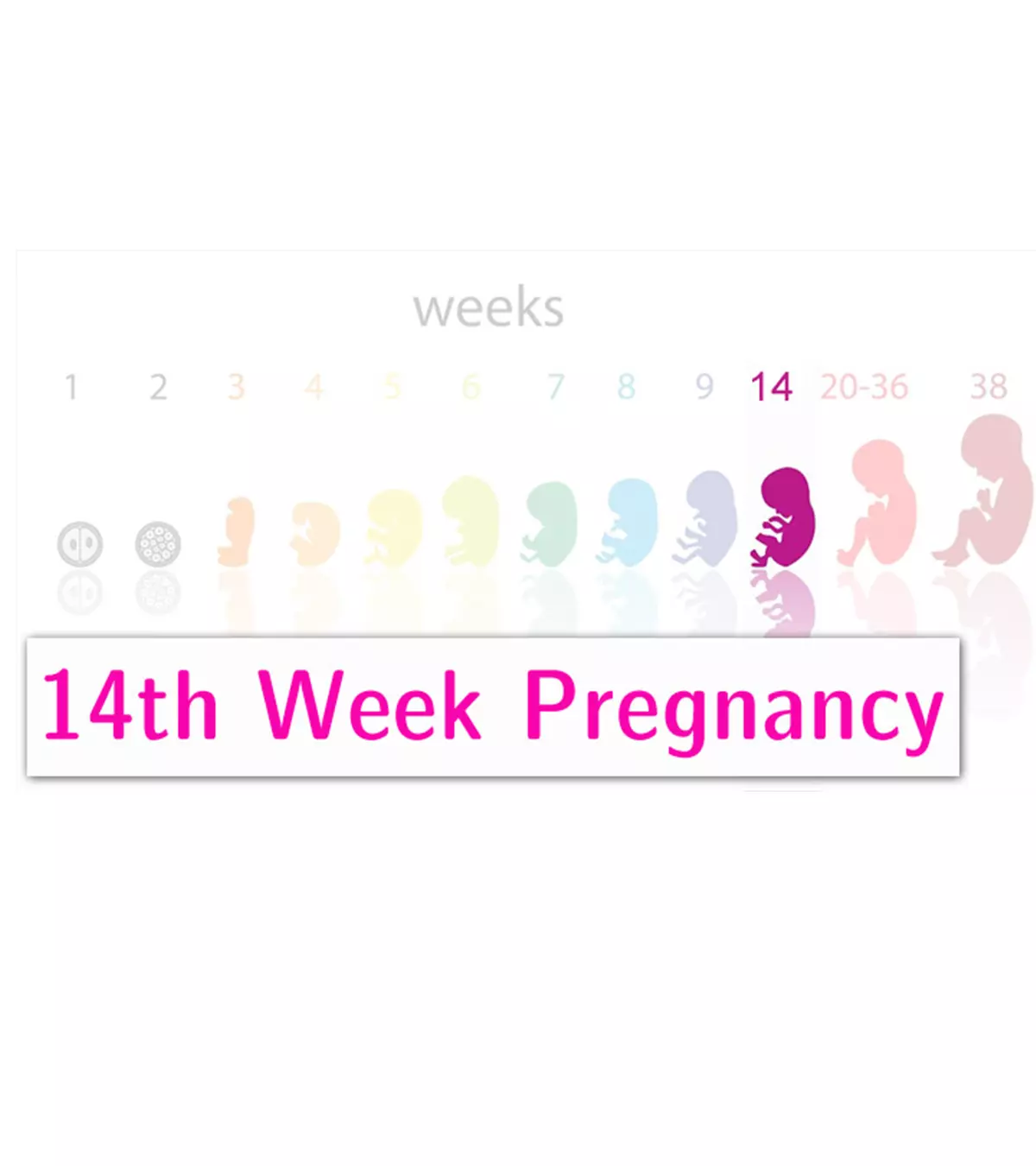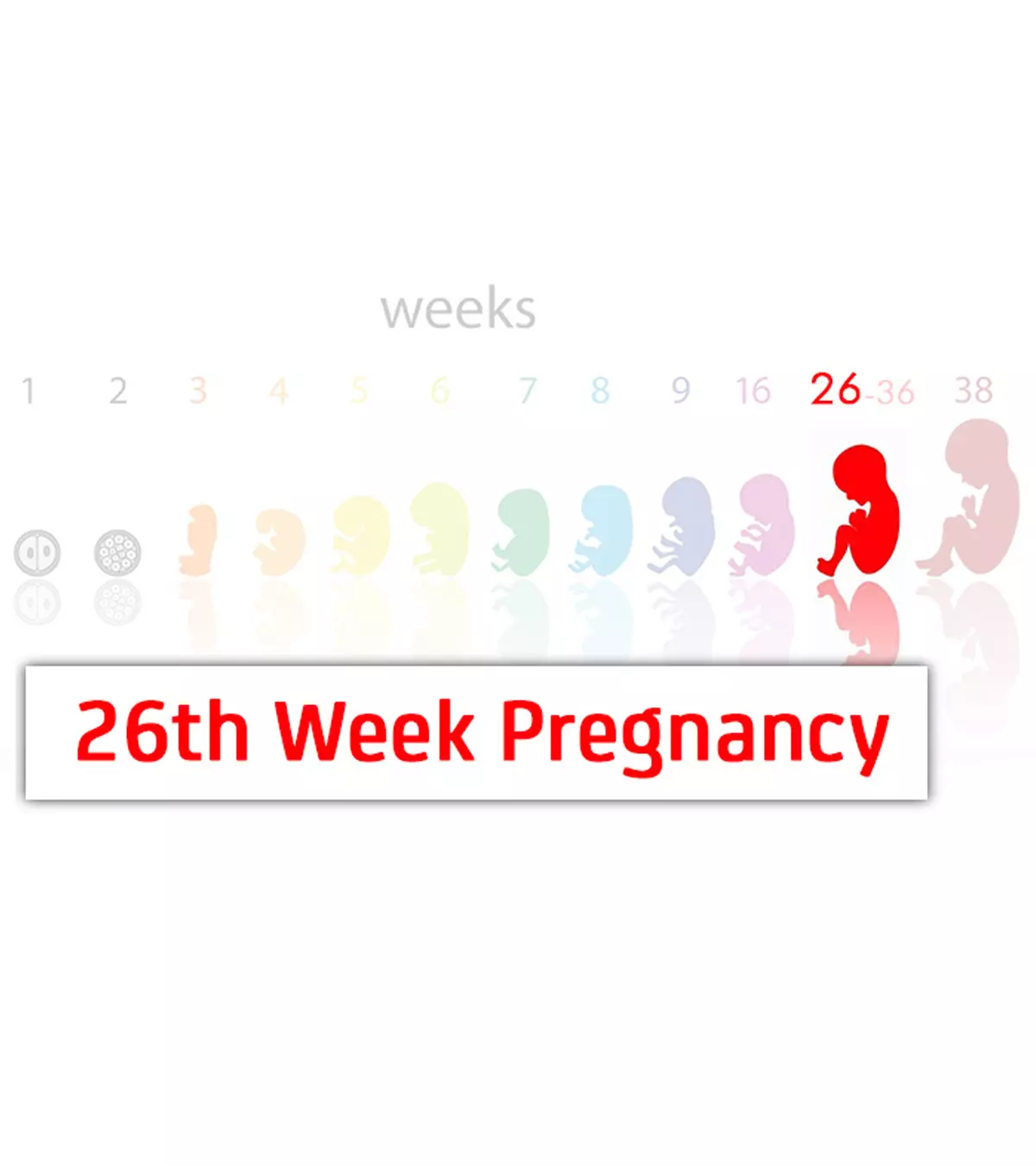
Image: Shutterstock
Key Pointers
- At 26 weeks, the fetus measures approximately 14.01 inches and weighs between 1.5 to 1.7 pounds.
- The skin of the baby is covered with vernix, and the fetus may respond to sound. During this week, kicks and punches become more noticeable.
- Pregnant women may experience several discomforts such as trouble sleeping, itching, false contractions, headaches, and bloating.
- Additionally, physical changes like increased body weight, swollen breasts, and stretch marks may become more prominent.
- Around this time, doctors may order a glucose tolerance test for gestational diabetes.
- To maintain overall well-being, it is recommended that pregnant women opt for healthy snacks, stay hydrated, engage in moderate exercise, and minimize stress.
How Many Months Pregnant Are You At 26 Weeks?
In the 26th week of pregnancy, you are six months and three weeks pregnant. You are just two weeks away from entering the third trimester with your estrogen levels at its peak.
By now, your baby develops a human form, and things start to move a bit faster than usual.
Here, we explain the baby’s development, changes in your body, precautions to take and the tips to follow when you enter the 26th week.
How Big Is Your Baby At 26 Weeks?
At 26 weeks, the baby is as big as a scallion
(1). The baby measures about 14.01in (35.6cm) and weighs around 1.5 to 1.7lb (600-800g) (2).
 Quick fact
Quick factHere is a look at how your baby is developing inside the womb during the 26th week.
Baby Development In The 26th Week
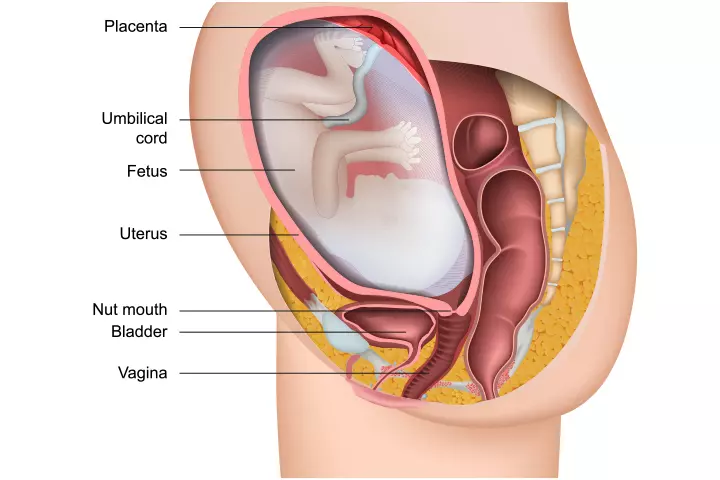
In this week, the baby’s body parts are developing as follows (3):
| Body parts | Development |
|---|---|
| Eyes | Begin to open and close. The iris doesn’t display its actual color yet, so the eyes are still blue. |
| Skin | Covered by a waxy coating called vernix caseosa. Body fat starts accumulating under the skin. Melanin, which gives color to the skin, is formed. |
| Fingers and toes | Fingerprints and footprints are formed. |
| Auditory system | The baby starts responding consistently to sounds. |
| Lungs | The air sacs are formed, but lungs are not fully matured. They begin production of surfactant that prepares the lungs for breathing. The amniotic fluid swallowed by the baby also aids in lung development at this stage. |
| Limbs | Arms and legs are fully developed. Sucking movements and baby kicks are more prominent. |
| Digestive system | Still developing (5) |
| Brain | Developing; The nervous system is somewhat developed and controls certain bodily functions. |
| Heart | Fully functional and beating at the rate of 140/minute. |
| Mouth | Tooth buds and taste buds are developing. |
| Hair | Eyelashes and eyebrows are formed while the hair on the head is growing longer. |
Fetal movements at 26 weeks:
The kicks and punches are more prominent by this time. The baby develops sleep patterns and is likely to be more active during the night.
As your pregnancy progresses, the level of discomfort also increases.
What Are The Symptoms You Have In The 26th Week Of Pregnancy?

Here are a few symptoms you might have at this time:
- Trouble sleeping: By this time, getting a good night’s sleep becomes difficult. A meta analysis conducted by multiple institutions revealed that the overall prevalence of insomnia during the second trimester came to be around 27.2%. Gentle exercises and use of extra pillows can help you settle down at night.
- Swelling: Water retention in the body causes swelling of the feet, hands, and face. Severe swelling could be a sign of preeclampsiaiA pregnancy disorder characterized by high blood pressure, water retention, and protein content in urine. and needs medical attention.
- Headaches/ migraines: These could be a cause of hormonal fluctuations or stress. Meditation and yoga can relieve the stress. Acupuncture and biofeedbackiA mind-body technique that helps you control your automatic body functions to improve your medical conditions. are other alternative therapies that are safe for treating migraine during pregnancy (4).
- Forgetfulness: Due to the hormonal fluctuations, you may experience temporary memory loss. So noting down important things on a notepad or your smartphone can help. If the forgetfulness is frequent and prominent, then a medical examination might be necessary.
- Braxton Hicks contractions: Some pregnant women may experience irregular contractions, also called as Braxton Hicks contractions. If the contractions are occurring at regular intervals and are painful, then consult the doctor immediately as it could be a sign of preterm labor. However, Braxton Hicks contractions will not affect your cervix or cause it to dilate.
- Itching: It happens due to the stretching of the skin. Severe itching could be due to intrahepatic cholestasis of pregnancy, which is a liver disorder that requires treatment as it can affect the baby and might need delivery before the estimated due date.
- Bloating and gas: The growing uterus pushes the stomach out, causing bloating. Also, the progesterone hormone relaxes the gastrointestinal muscles, which slows down the digestion process and makes you feel bloated. With the growing baby, the body also undergoes several physical and mental changes.
Changes In The Body In The 26th Week
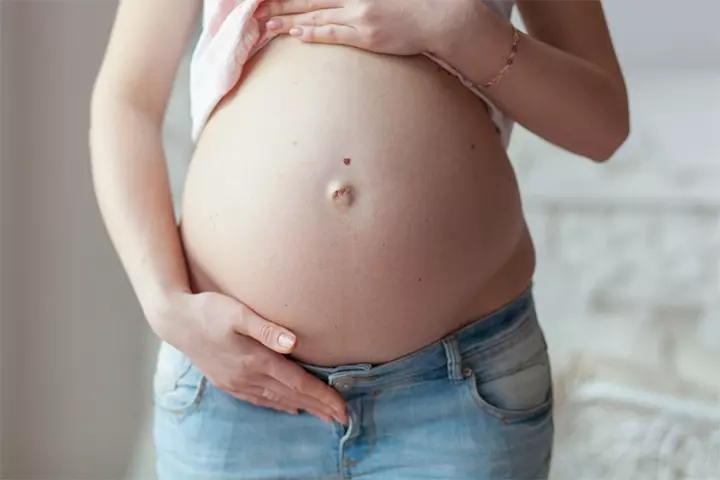
Physical changes:
- Enlarged belly: In this week, the uterus is further stretched, and the baby bump looks bigger with a protruding navel. The top of the uterus can be felt about 2 ½ inches above the belly button.
- Swollen breasts
- Blue veins are more prominent as there is more blood flow towards the pelvic region and the breasts.
- Stretch marks
 Be watchful
Be watchfulEmotional changes:
- Mood swings
- Anxiety
While these are common changes that most women experience, some unusual symptoms may indicate preterm labor, which warrants immediate medical attention.
Your OB/GYN Visit

The doctor’s visit might include:
- Physical tests including weight check, blood pressure, and fundal heightiThe distance from the top of the uterus to the pubic bone, often measured to track fetal growth. measurement.
- Glucose tolerance test to check for gestational diabetesiPregnancy-specific condition characterized by high blood sugar levels, which may pose a risk of complications. . Testing for glucose impairment is done at first antenatal visit and then repeated at 24-28 weeks. Different countries follow different protocols. Some use two-step screening, where first a GCT (glucose challenge test) is done and if found abnormal GTT (glucose tolerance test) is done. However, most countries recommend a single-step 75gm GTT.
 Quick tip
Quick tipTips To Follow

Here are some tips that help you stay healthy during pregnancy.
- Drink a lot of water to stay hydrated.
- Follow a healthy lifestyle and eat home-cooked food. Include fish like pollock, salmon, shrimp, catfish, anchovies, and cod that are good sources of omega-3 fatty acids. Avoid shark, tilefish, king mackerel and swordfish as they contain high levels of mercury.
- Avoid smoking and drinking alcohol. Excessive caffeine is also bad, as it can affect fetal development.
- Continue taking prenatal vitamin supplements like folic acid and iron.
- Engage in moderate physical activities like walking.
- Stay calm and keep stress at bay.
- Your body needs enough rest, so relax as much as you can.
- Do not take any medication without the doctor’s permission.
- Wear loose, breathable clothes.
- Maintain oral hygiene.
- Avoid exposure to toxic chemicals.
- Avoid cleaning the cat litters to avoid toxoplasmosisiAn infection caused by the Toxoplasma gondii parasite, typically found in undercooked meat, animal feces, and contaminated soil. .
You should also
- Engage yourself in reading books and activities as a part of your prenatal care to make yourself feel happy.
- Carry fruits and healthy snacks with you, if you are a working woman.
- Spend more time with family and friends.
You need all the support you can get from your partner when you are pregnant. Find out more about it next.
Tips For Dad-To-Be

Here’s what your partner can do:
- Help with household chores
- Create a good environment at home
- Attend all the prenatal visits with you
- Plan for maternal shopping and outings
- Give you a good neck and foot massage
Frequently Asked Questions
1. What does a baby of 26 weeks look like?
By 26 weeks, a normally developing fetus can measure more than 30cm and weigh 820g. The ultrasound can clearly show the growing baby at this time. They start to develop muscles and fats in the body from 26 weeks and look like a newborn baby (5).
2. How often should a baby kick at 26 weeks?
Babies can kick several times a day. Some women with high blood pressure and gestational diabetes notice kick count from around 26 to 32 weeks. Babies tend to be active in the evening and often experience most movements during this time. You may count baby movements for two hours, and laying down could help you feel the kicks better.
If the kick counts are less than six in two hours, doctors may do some evaluation. However, these measures are highly variable since some healthy babies may also kick less than usual. You may count at the same time each day for the accuracy count (6).
3. Why do I feel so tired at 26 weeks pregnant?
At 26 weeks, the growing belly adds extra weight to your body and makes it challenging to move around (7). Weight gain coupled with hormonal changes and sleep disturbances is another reason why several women get the feeling of fatigue during pregnancy.
4. How to stop contractions at 26 weeks?
Your healthcare provider offers the proper treatment to manage your contractions during the 26th week of pregnancy. Progesterone is one hormonal treatment that is provided between 16 and 24 weeks until you are 34 weeks pregnant. It helps prevent contractions. A cervical stitch is another option for reducing the risk of premature labor. These interventions are potential strategies to address contractions during pregnancy (8).
If you are in the 26th week of pregnancy, you have almost completed your first and second trimesters and will soon be introducing your baby to the world. Your baby can now kick and punch, and you may start to feel Braxton Hicks contractions. You may also experience other pregnancy-related discomforts such as swelling, sleeping troubles, and headaches. While your discomforts may increase as you advance to the 27th week of pregnancy, try to maintain a positive attitude, surround yourself with loved ones, and follow a healthy lifestyle. Also, try to relax and enjoy this stage since you’ll get to meet your little one soon!
Infographic: Advice On Being Healthy During 26th Week Of Pregnancy
Being 26 weeks pregnant means you’re nearing the end of your second trimester. Your belly bump will be more evident by this time, and you may experience several physical and emotional changes. Therefore, it is important to maintain good health to ensure a safe pregnancy. Check out the infographic below to know in detail. Illustration: Momjunction Design Team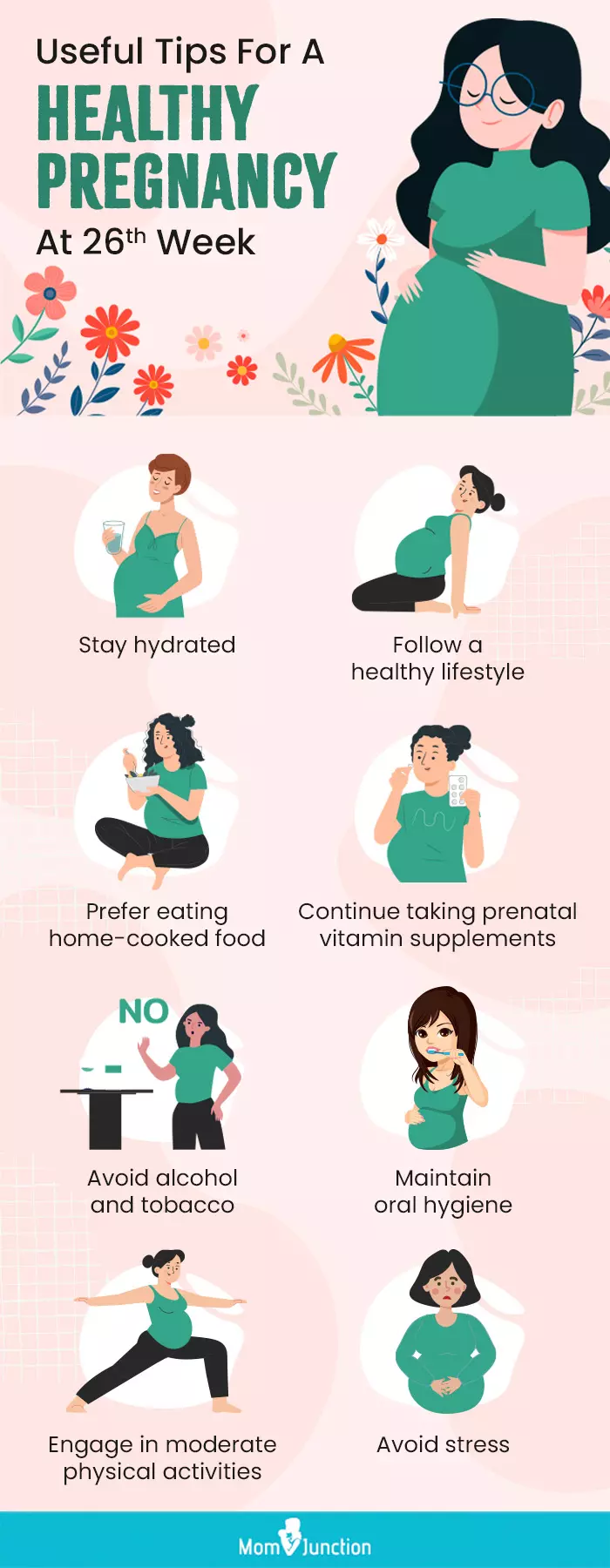
Illustration: 26th Week Pregnancy: Symptoms Baby Development And Tips
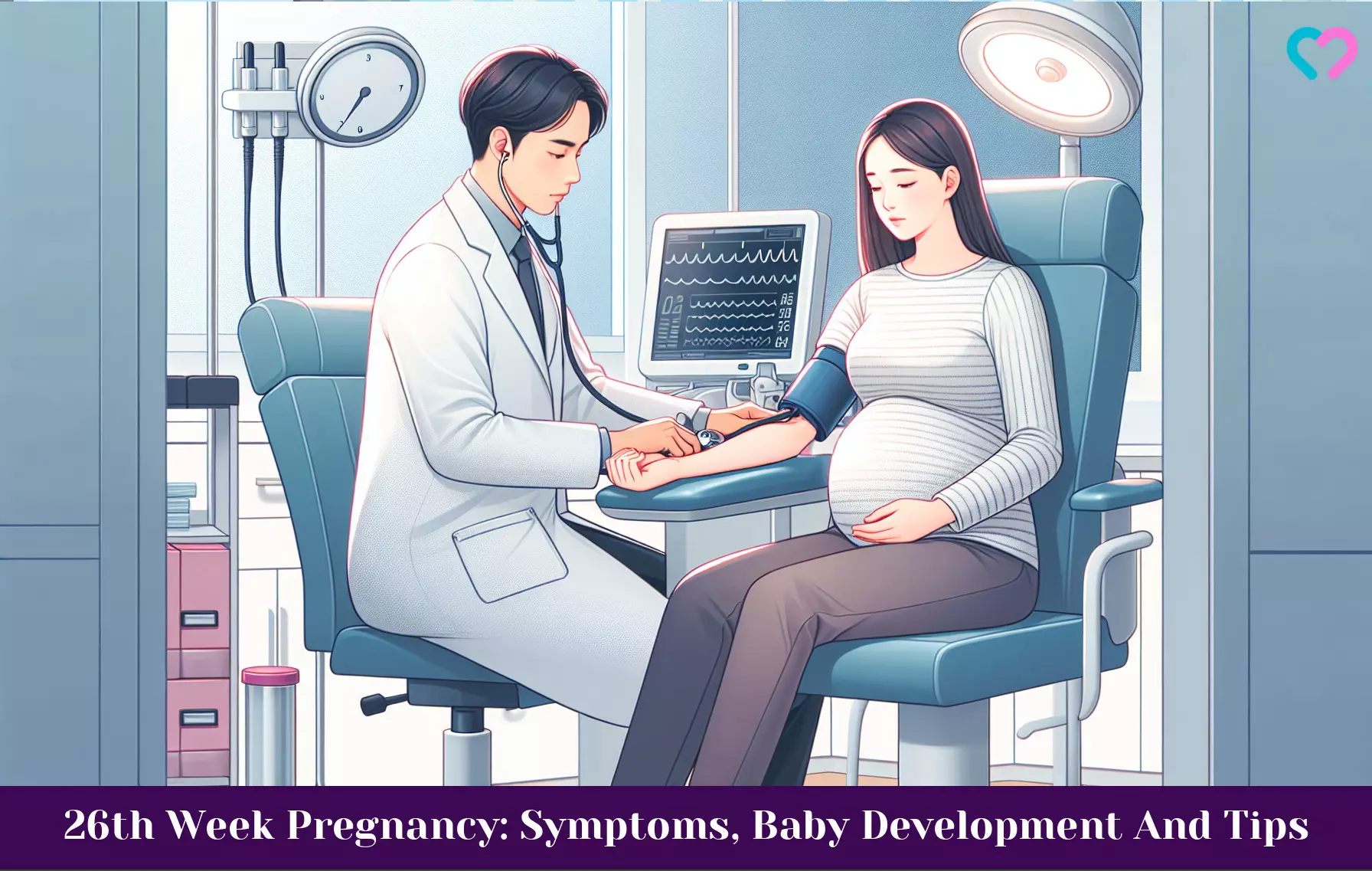
Image: Dall·E/MomJunction Design Team
Week 26 is a transitional phase between the second and third trimesters. Learn more about your baby’s development and what to expect during this phase.
References
- Fetal Development.
https://embryology.med.unsw.edu.au/embryology/index.php/Fetal_Development - Fetal development.
https://medlineplus.gov/ency/article/002398.htm - Pregnancy week-by-week.
https://www.nhs.uk/pregnancy/week-by-week/ - Non-pharmacological management of migraine during pregnancy.
https://www.semanticscholar.org/paper/Non-pharmacological-management-of-migraine-during-Airola-Allais/5ad5b6fcd0d09b647539f10b03a6b37506200ce4?p2df - Pregnancy at week 26.
https://www.pregnancybirthbaby.org.au/pregnancy-at-week-26 - Fetal movement and kick counts.
https://www.pregnancyinfo.ca/your-pregnancy/healthy-pregnancy/kick-counts/ - Week-by-week guide to pregnancy;
https://www.nhs.uk/start-for-life/pregnancy/week-by-week-guide-to-pregnancy/2nd-trimester/week-26/ - Treatment to prevent a premature birth.
https://www.tommys.org/pregnancy-information/premature-birth/treatment-to-prevent-a-premature-birth - Week 26 – your 2nd trimester
https://www.nhs.uk/start-for-life/pregnancy/week-by-week-guide-to-pregnancy/2nd-trimester/week-26/
Community Experiences
Join the conversation and become a part of our nurturing community! Share your stories, experiences, and insights to connect with fellow parents.
Read full bio of Dr. Asmita Kaundal
Read full bio of shreeja pillai
Read full bio of Rebecca Malachi
Read full bio of Aneesha Amonz








